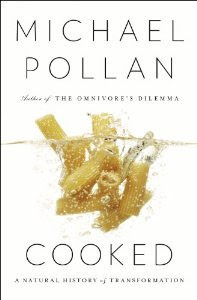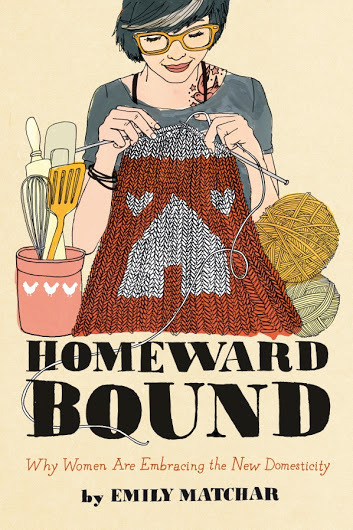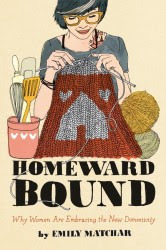Emily Matchar's Blog, page 2
April 18, 2013
This is why I find Michael Pollan incredibly annoying
 In today’s New York Times, foodie guru Michael Pollan waxes poetic on why we all must cook. You guys already know this topic annoys me, as I argued last week in The Atlantic that not everyone likes to cook, and that healthy fast food would be a perfectly valid option for them.
In today’s New York Times, foodie guru Michael Pollan waxes poetic on why we all must cook. You guys already know this topic annoys me, as I argued last week in The Atlantic that not everyone likes to cook, and that healthy fast food would be a perfectly valid option for them.
As Pollan (quoted by Mark Bittman) says:
“We do find time for activities we value, like surfing the Internet or exercising,” says Pollan. “The problem is we’re not valuing cooking enough. Who do you want cooking your food, a corporation or a human being? Cooking isn’t like fixing your car or other things it makes sense to outsource. Cooking links us to nature, it links us to our bodies. It’s too important to our well-being to outsource.”
“Outsourcing” is such a loaded, nasty word. Why is eating out or buying pre-prepped food “outsourcing”? Is buying my clothes rather than sewing them myself “outsourcing”? Is sending my kid to public school rather than homeschooling “outsourcing”? We live in a society. It seems perfectly reasonable that some people cook, others buy cooked food.
And it’s unbelievably twee and silly to be all “cooking is a must-do because it links us to nature.” Because, come on, you know what else links us to nature? Hiking. Raising pigeons. Giving birth in a field. Some of these things may be fun and good for us (I’ll skip the latter though, thanks), but they’re not mandatory for healthy living.
Home cooking is not some universal “natural” activity either. In some countries, it’s practiced much more than others. I live in Hong Kong, where few people cook much at home because of small kitchens, long work hours, and a cultural tradition of dining out as a social activity. Is that unnatural? Are people here disconnected to their bodies? (The obesity level is really low here, btw).
Another major point of annoyance is Pollan’s repeated insistence that home cooking died because women were duped into thinking it was cool and feminist to stop cooking:
And yet Big Food has convinced most of us: “No one has to cook! We’ve got it covered.” This began 100 years ago, but it picked up steam in the ’70s, when Big Food made it seem progressive, even “feminist,” not to cook. Pollan reminded me of KFC’s brilliant ad campaign, which sold a bucket of fried chicken with the slogan “Women’s Liberation.”
Bullshit. As I’ve argued before, it wasn’t in the 1970s feminist era that “big food” sold women on the idea of not cooking. That happened several decades before, in the 1940s and 1950s, long before second-wave feminism was a gleam in Betty Friedan’s eye.
I do appreciate this bit:
“But if we’re going to rebuild a culture of cooking, it can’t mean returning women to the kitchen. We all need to go back to the kitchen.”
OK, whatever, Michael Pollan et al. Go back to the kitchen if you want. Let your partner cook if you want (and they want). Eat Whole Foods salads every night if you want (and can afford it). But quit it with the annoying insistence that everyone who hates cooking is just deluded, and that tying on an apron is the only way to avoid obesity.
DON’T FORGET: Pre-order Homeward Bound by May 7, and we donate $1 per copy to the National Partnership for Women and Families.
April 17, 2013
Exciting news! Pre-order “Homeward Bound” by May 7, we donate $1 to help families

Hi guys. I’ve got big news, and a very special request:
If you’re thinking about buying a copy of Homeward Bound, I would love it if you could pre-order it on Amazon or IndieBound by May 7 (the book’s release date).
Why? Because, for every copy sold by May 7, we will donate $1 to the National Partnership for Women and Families. This is an awesome, four-star charity which works to further fairness in the workplace and other policies to “help women and men meet the dual demands of work and family.” They fight for things like equal pay for men and women, paid sick days, and anti-pregnancy discrimination legislation.
Since so much of Homeward Bound is about the continued difficulties of raising a family while balancing work and life in America (the ONLY developed country with no mandatory paid maternity leave!), it seems appropriate that some of the proceeds of the book should go towards fighting for better conditions for all our families. I would love it if you could help make this happen!
How to participate:
- Pre-order your book on Amazon HERE or IndieBound HERE.
- Send me an email (ematchar@gmail.com) or a Tweet (@emilymatchar) with the words “pre-ordered.”
Share via social media to encourage more donations:
Twitter: I pre-ordered Homeward Bound. Join the movement & @emilymatchar will give $1 to @NPWF #homewardbound
Facebook Status: I just pre-ordered Homeward Bound at Amazon/IndieBound. Do the same and author Emily Matchar will donate $1 to the National Partnership for Women and Families! Just email her at ematchar@gmail.com or Tweet her at @emilymatchar to say you’ve pre-ordered.
Here are some kind words from people that have read my book so far:
“The brilliance of Emily Matchar’s new book is that it exhaustively describes what disillusioned workers are opting into: a slower, more sustainable, and more self-sufficient lifestyle that’s focused on the home. Matchar synthesizes dozens of trend stories … into a single, compelling narrative about the resurgence of domesticity….Refreshing.” - The New Republic
“Cogently argues that choosing a more hands-on, DIY lifestyle – family farming, canning, crafting, can, without sacrificing feminism’s hard-won gains, improve on an earlier time when ‘people lived more lightly on the earth and relied less on corporations, and family and community came first.’” - ELLE
“A lively and perceptive reporter… [Matchar] offers a valuable and astute assessment of the factors that led to the current embracing of domesticity and the consequences of this movement.”—Publishers Weekly
“A well-researched look at the resurgence of home life…. Offers intriguing insight into the renaissance of old-fashioned home traditions.”— Kirkus Reviews
April 15, 2013
Why healthy fast food would be awesome and I would eat it all the time
 At The Atlantic, I’ve written about why healthy fast food should be a goal for food reformers. So much progressive food culture centers around promoting home cooking as a solution to obesity and other social woes – Jamie Oliver’s Food Revolution, Michelle Obama’s Let’s Move, every other Mark Bittman column in the New York Times.
At The Atlantic, I’ve written about why healthy fast food should be a goal for food reformers. So much progressive food culture centers around promoting home cooking as a solution to obesity and other social woes – Jamie Oliver’s Food Revolution, Michelle Obama’s Let’s Move, every other Mark Bittman column in the New York Times.
Great, I say. But why not promote cheap, healthy fast food as an equally good option for improving America’s health? I think part of it is this:
Yet America, even as it reaches for convenience, has the deep seated belief that cooking is a personal obligation, and that shirking this obligation is lazy, harmful, bad.
Thoughts? If you could eat healthy, cheap fast food every night, would you still cook? Do you like to cook? If not, do you feel bad about it?
April 11, 2013
The New Republic review of Homeward Bound
 A really smart, really insightful review of Homeward Bound by Ann Friedman (I’m a huge fan of her hilarious pie charts) in The New Republic.
A really smart, really insightful review of Homeward Bound by Ann Friedman (I’m a huge fan of her hilarious pie charts) in The New Republic.
An excerpt:
The brilliance of Emily Matchar’s new book, Homeward Bound: Why Women Are Embracing the New Domesticity, is that it exhaustively describes what disillusioned workers are opting into: a slower, more sustainable, and more self-sufficient lifestyle that’s focused on the home. The woman who leaves the public workplace is “the Brooklyn hipster who quit her PR job to sell hand-knitted scarves at craft fairs,” Matchar writes. “She’s the dreadlocked ‘radical homemaker’ who raises her own chickens to reduce her carbon footprint. She’s the thirty-one-year-old new mom who starts an artisan cupcake company from her home kitchen rather than return to her law firm. He’s the hard-driven Ivy Leaguer fleeing corporate life for a Vermont farm.” Though the vast majority of Machar’s subjects are women, this is not just a story about gender roles. It’s about what happens when the structures we were raised to buy into don’t provide what they were supposed to provide, and the alternative values that have, for a growing subset of Americans, come to replace them.
If this makes you want to read Homeward Bound, there are 26 days until publication! Pre-order now at Amazon or IndieBound.



